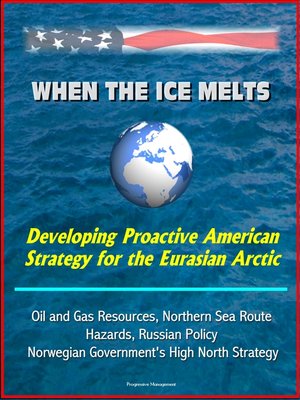When the Ice Melts
ebook ∣ Developing Proactive American Strategy for the Eurasian Arctic--Oil and Gas Resources, Northern Sea Route, Hazards, Russian Policy, Norwegian Government's High North Strategy
By Progressive Management

Sign up to save your library
With an OverDrive account, you can save your favorite libraries for at-a-glance information about availability. Find out more about OverDrive accounts.
Find this title in Libby, the library reading app by OverDrive.



Search for a digital library with this title
Title found at these libraries:
| Loading... |
Professionally converted for accurate flowing-text e-book format reproduction, this study examines possible American strategies for dealing with changes in the Arctic region brought about by climate change and global warming.
The confluence of environmental, energy, and economic issues associated with Arctic ice recession warrants proactive American strategy to account for increased human activity within the Eurasian Arctic region. This paper examines the time frame associated with sea ice recession, the availability of oil and gas resources shared by Norway and Russia, the potential time and cost savings associated with utilization of the Northern Sea Route (NSR), and the hazards induced by Arctic operations. The paper considers Norwegian and Russian Arctic strategies and juxtaposes them with current American policy to derive recommendations for American strategy pertaining to the Eurasian Arctic. To envision the Eurasian Arctic in 2025, America should seek a free flow of global trade along the NSR, a minimal international military presence in the Arctic, an economically stable Russia, a strong Norwegian partner, and an improved international cooperation on environmental and maritime safety issues. Recommendations include accession to the United Nations Convention on the Law of the Sea, modified engagement with Russia, support for Norwegian regional leadership, and increased utilization of multilateral forums to address environmental, safety, and security concerns.
Trends in global weather patterns are expected to open unprecedented access to the Arctic in the coming century. Warming has resulted in an increasing seasonal recession of Arctic ice that exposes previously inaccessible resources and waterways. This development has the potential to fundamentally shift the geopolitical landscape across the Arctic with particular influence on areas rich in oil and gas deposits lying submerged beneath continental shelves. The confluence of environmental, energy, and economic issues associated with Arctic ice recession warrants proactive policy by Arctic nations in anticipation of increased human activity within the Arctic region.






